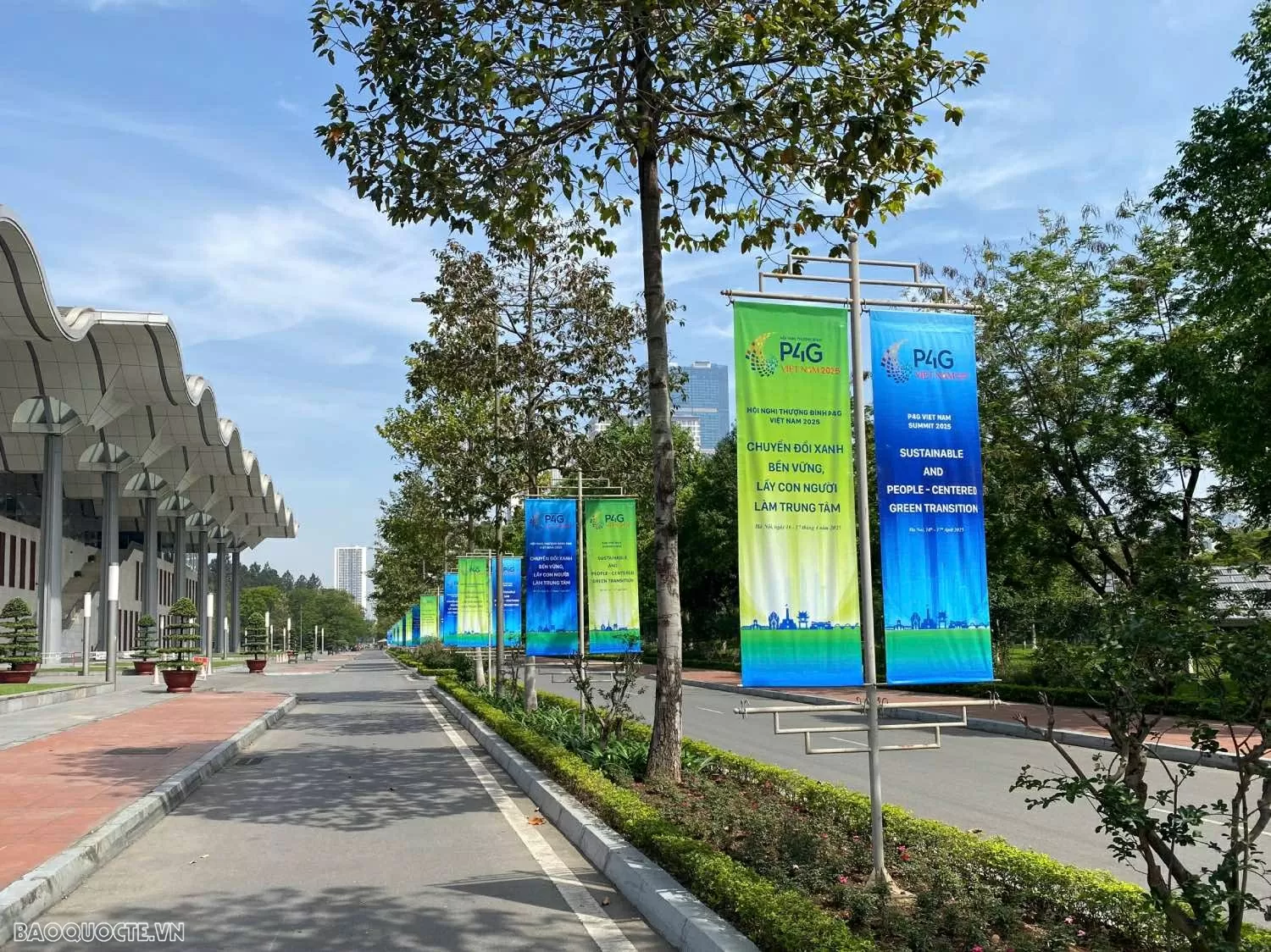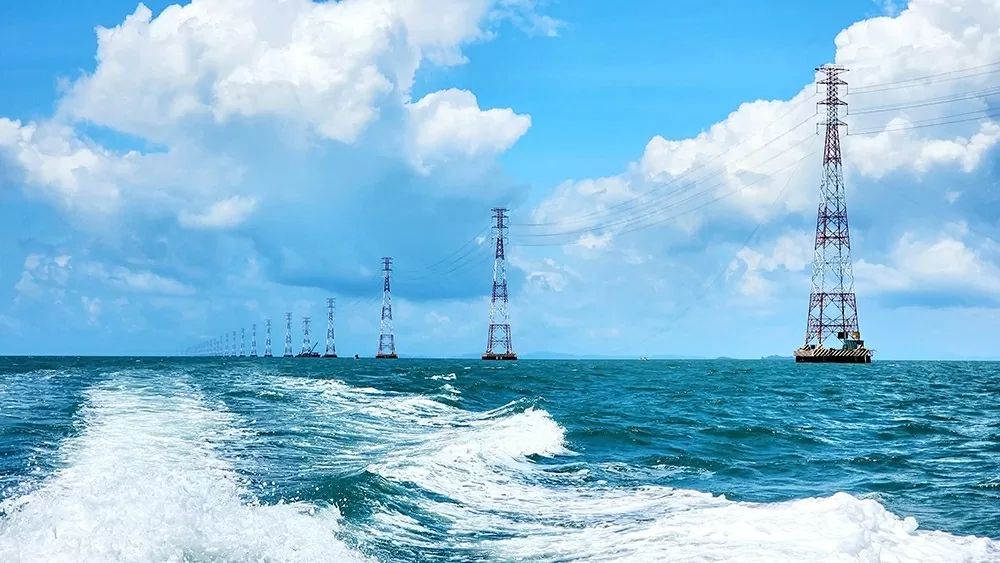
4th P4G Summit: A golden opportunity for Vietnam to position itself as a green investment destination
Latest
 |
| Mr. Erick Contreras, Vice Chairman of the European Chamber of Commerce in Vietnam (EuroCham). |
Mr. Erick Contreras, Vice Chairman of the European Chamber of Commerce in Vietnam (EuroCham) had a talk with reporters of The World and Vietnam Report about Vietnam's journey towards green growth. He especially emphasized that the Vietnam has significant potential in a number of areas to support green growth.
Vietnam has affirmed strong commitments and specific actions on green transformation, such as the Government's issuance of the National Strategy on Green Growth for the 2021-2030 period and vision to 2050; promulgating policies to respond to climate change, reduce emissions, convert energy, and implement carbon neutrality commitments. How do you evaluate Vietnam's recent green transformation journey?
Vietnam has taken commendable steps in its green transformation journey, with a clear national strategy and forward-looking commitments. The National Strategy on Green Growth (2021–2030, vision to 2050) serves as a strong foundation, aligning the country’s development with sustainability goals. Moreover, the Power Development Plan VIII (PDP8), the backbone of Vietnam’s energy roadmap for the next decade, is a critical milestone. It integrates ambitious targets for renewable energy while seeking to ensure energy security and economic competitiveness.
In recent years, the renewable energy sector has shown remarkable progress, especially in solar power. Vietnam has emerged as a regional leader in solar deployment, outpacing many neighboring ASEAN countries in capacity growth over the past five years. The surge in rooftop solar installations, combined with the introduction of the Direct Power Purchase Agreement (DPPA) mechanism, signals a shift toward more decentralized and business-driven green energy solutions. These developments are empowering industrial parks and manufacturers to take direct control over their energy sources and emissions profiles.
Another promising development is the implementation of the Extended Producer and Importer Responsibility (EPR) regulations. This is a pivotal step forward in supporting a circular economy model, ensuring that businesses are accountable for the lifecycle impact of their products, and encouraging greener production and recycling systems.
Besides renewable energy, what other advantages does Vietnam have, in your opinion?
Beyond renewables, Vietnam possesses significant potential in several other areas supporting green growth. Its circular economy capabilities are expanding, especially through the EPR frameworks and the emergence of bio-based, biodegradable and compostable materials. Many Vietnamese SMEs are already innovating in this space, offering alternatives to fossil-based plastics and chemicals derived from abundant biomass sources such as rice husks, bagasse, and coconut fibers.
Vietnam also enjoys a long coastline, which opens the door to explore marine-based renewables, such as tidal and wave energy. While still nascent, this is an area that could attract strategic investments and technological partnerships in the future.
In addition, hydropower continues to play a key role in Vietnam’s renewable energy mix, and while large-scale expansion may be limited, modernization and efficiency upgrades in existing hydro plants offer an untapped opportunity.
 |
| EuroCham’s expectation is that P4G will help build stronger bridges between global solution providers and Vietnam’s development goals, aligning international resources with domestic green priorities. (Photo: Viet Hoang) |
Are European investors interested in the renewable energy sector in Vietnam, sir? What do you think are the opportunities for cooperation between Vietnam and Europe in this field?
Vietnam has been progressing as one of the most dynamic markets in the region. The scale of demand, government commitment, and natural resource potential add to the attractiveness of Vietnam as a destination for sustainable investment.
That said, to retain and scale up European investment – particularly in offshore wind, which is capital-intensive and long-term – Vietnam must accelerate the establishment of clear legal and regulatory frameworks. Investors are looking for bankable power purchase agreements, efficient licensing and approval mechanisms, and transparent land-use policies.
There is also room to enhance cooperation on grid development, smart energy and storage systems and water-resilient blue-green infrastructures, where European expertise and technologies can be leveraged. Vietnam and the EU share a strong commitment towards sustainability. Strengthening technical cooperation – especially through readily available pathways like the EU-Vietnam Free Trade Agreement (EVFTA) and EuroCham’s flagship event Green Economy Forum & Exhibition (GEFE) – can help scale up investments, innovation, and joint ventures in clean energy.
What difficulties and challenges does Vietnam currently face in green transformation, sir? How can we resolve those difficulties and challenges?
As supply chains diversify and the global economy transitions toward sustainability, Vietnam is well-positioned to become a manufacturing hub for low-carbon products and a destination for green foreign direct investment. However, challenges persist, ranging from fragmented regulations to infrastructure bottlenecks and limited access to green finance for smaller players. The absence of detailed implementation plans, combined with institutional capacity constraints, can slow down progress.
In wind energy, where Vietnam still lags behind despite its vast potential. Nearshore and offshore wind developments have been slower than anticipated, primarily due to regulatory uncertainty, lack of bankable frameworks, and slow permitting processes. Additionally, Vietnam needs to strengthen its implementation capabilities and build-up of critical infrastructures, especially for grid connection and electricity distribution. While commitments are solid on paper, clear roadmaps, robust monitoring mechanisms, and emissions accounting systems are essential to track progress and ensure that goals for 2030, 2040, and ultimately 2050 are met.
To overcome these barriers, Vietnam must maintain its current direction while moving faster and deeper into execution. This includes issuing clearer secondary legislation (e.g. EPR circular), developing sector-specific roadmaps (e.g. water-resilient blue-green infrastructures), and enhancing capacity at both central and local levels. It also means fostering public-private dialogue to align policies with business needs and unlock funding for innovative and green projects.
EuroCham appreciates and acknowledges the Vietnamese government’s openness and forward-looking vision. Continued engagement with all stakeholders – government, industry, and civil society – will be crucial to accelerate the green transition.
 |
| Vietnam also enjoys a long coastline, which opens the door to explore marine-based renewables, such as tidal and wave energy. (Photo: Vietnam Energy) |
As a bridge between European investors and Vietnam, especially in the context of many changes in the global application chain, in the coming time, what policies, initiatives and cooperation will EuroCham have with Vietnam to move towards green and sustainable economic development?
As the bridge between European businesses and Vietnamese institutions, EuroCham is committed to playing a proactive role in Vietnam’s sustainable economic development. This year, our Green Growth Sector Committee’s focus is on the “must-win battles” of the green agenda, namely, renewable energy clarity, EPR implementation, and water-resilient blue-green infrastructure (BGI).
We are prioritizing policy advocacy, capacity building, and multi-stakeholder coordination. Through initiatives such as GEFE, we facilitate knowledge exchange, promote cutting-edge European technologies, and enable value chain collaboration between EU companies and Vietnamese counterparts. Additionally, we have been and will continue to actively engage in joint activities with other chambers, multilateral partners, and Vietnamese ministries to amplify impact.
The upcoming EuroCham Whitebook launch, taking place in Hanoi on Friday, 11 April 2025, will offer further evidence-based recommendations to guide policymaking and investment in green transformation.
We believe Vietnam can lead in the region, and EuroCham stands ready to support this journey through collaboration, innovation, and investment facilitation.
Partnering for Green Growth and the Global Goals 2030 (P4G) is an important forum for developing countries to tap international resources towards a green, inclusive, sustainable and innovative transformation. This year, Vietnam will host the fourth P4G Summit. What are EuroCham’s expectations for this Summit?
Hosting the P4G Summit presents a golden opportunity for Vietnam to position itself as a green investment destination and regional sustainability leader. EuroCham views this event as a great platform to catalyze new partnerships in green finance, sustainable technology, and inclusive innovation.
We hope the summit will promote Vietnam’s role in the EU’s Global Gateway strategy, strengthening the SME ecosystem so it can better support large-scale FDI in green industries. The event can also help mobilize financing for climate projects, especially through blended finance models, and unlock resources for both public and private initiatives.
EuroCham’s expectation is that P4G will help build stronger bridges between global solution providers and Vietnam’s development goals, aligning international resources with domestic green priorities.
Thank you so much!













